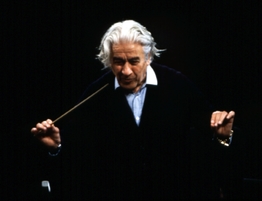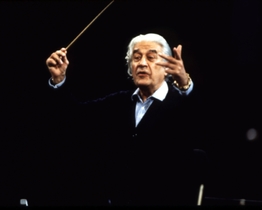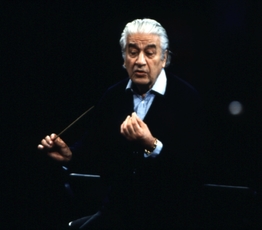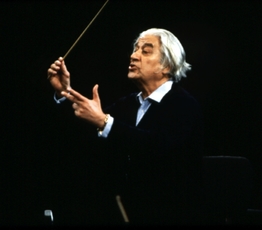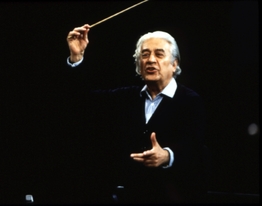
Sergiu Celibidache
Über
Born in Iasi, Romania, in 1912, Sergiu Celibidache began his studies in music in Berlin in 1939 at the Hochschule für Musik, where he was taught by, amongst others, Fritz Stein. He went on to take a doctorate at the University of Berlin with a thesis on Josquin Desprez. It can truly be said that his career started at the top in the same year in which he completed his studies, 1945, he was appointed principal conductor of the Berliner Philharmoniker, a position he retained until the return of Furtwangler to his old post, in 1952.
In 1948 Celibidache conducted a series of concerts with the London Philharmonic Orchestra. He also made countless guest appearances in Italy and other European countries as well as in North and Latin America. He conducted the Süddeutscher Rundfunk, based in Stuttgart, from 1959 and the London Philharmonic again in 1962-63 and from 1977. He became the director of the Stockholm Radio Symphony Orchestra in 1962, an ensemble he completely rebuilt, working there until 1971. From 1973-75 he was the primary permanent guest conductor of the French Orchestre National. 1979 saw him become the director of the Munich Philharmonic Orchestra, making it into one of the greatest orchestras in the world. There, as he had done in the Accademia Musicale Chigiana in Siena, he gave masterclasses in conducting.
It is not easy to classify Celibidache as a conductor. There are those who have described his exuberant, energetic, yet somewhat evasive personality as Latin-Slavonic. He was certainly renowned for the meticulous nature of his rehearsals. In works where a degree of orchestral showmanship is required, he was able to provide an astonishingly intense level of detail. At the same time, the standard German repertoire seemed to be something he mastered naturally, and he liked to describe himself as a purely German creation, musically speaking.
He conducted the first performances of Günter Bialas' Lamento di Orlando (1986), Harald Genzmer's Symphony No.3 (1986), Peter Michael Hamel's Symphony in three parts (1988) and Undine and Jeux des Tritons by Hans Werner Henze.
Celibidache also wrote his own music, notably a Requiem Mass, four symphonies and various other orchestral works, although he refused to allow any performances of these compositions. He continued to conduct, in spite of severe illness, until a few months before his death in 1996.
In 1948 Celibidache conducted a series of concerts with the London Philharmonic Orchestra. He also made countless guest appearances in Italy and other European countries as well as in North and Latin America. He conducted the Süddeutscher Rundfunk, based in Stuttgart, from 1959 and the London Philharmonic again in 1962-63 and from 1977. He became the director of the Stockholm Radio Symphony Orchestra in 1962, an ensemble he completely rebuilt, working there until 1971. From 1973-75 he was the primary permanent guest conductor of the French Orchestre National. 1979 saw him become the director of the Munich Philharmonic Orchestra, making it into one of the greatest orchestras in the world. There, as he had done in the Accademia Musicale Chigiana in Siena, he gave masterclasses in conducting.
It is not easy to classify Celibidache as a conductor. There are those who have described his exuberant, energetic, yet somewhat evasive personality as Latin-Slavonic. He was certainly renowned for the meticulous nature of his rehearsals. In works where a degree of orchestral showmanship is required, he was able to provide an astonishingly intense level of detail. At the same time, the standard German repertoire seemed to be something he mastered naturally, and he liked to describe himself as a purely German creation, musically speaking.
He conducted the first performances of Günter Bialas' Lamento di Orlando (1986), Harald Genzmer's Symphony No.3 (1986), Peter Michael Hamel's Symphony in three parts (1988) and Undine and Jeux des Tritons by Hans Werner Henze.
Celibidache also wrote his own music, notably a Requiem Mass, four symphonies and various other orchestral works, although he refused to allow any performances of these compositions. He continued to conduct, in spite of severe illness, until a few months before his death in 1996.
Would you prefer to visit our website in English?





